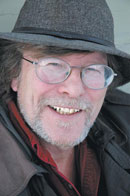Tired of ‘What Ifs’
Administrator | Aug 02, 2022 | Comments 5

Steve Campbell
Long, long ago I lived in a world of ‘What Ifs’. I was young, and I wasn’t sure if what I was about to do would bankrupt me, imprison me, result in divorce, or generate a possible zombie apocalypse.
I lost a lot of sleep back then, but I’m gaining it back now. The thing is: Life is made up of ‘What Ifs’. It is the actual definition of life. If you were an embryo, and pondering What If, you probably would not want to be born. This would probably cause great pain to your mother, who would need to carry you for another five years before you made up your mind. (This has relevance later, trust me.)
As we grow, we learn, we add skills to our bullet-belt, and we learn to trust ourselves. Eventually we learn to do what our gathered experience tells us to do. The What Ifs no longer keep us awake at night, wrestling with what might possibly happen in a future we haven’t seen yet.
I may have lost you there, so let’s jump into one of my famous stupid analogies: You know when you are in a dispute with someone, and you lay awake at night, and build a whole conversation in your head? “And he’s gonna say… And then I’m gonna say …” and you spend hours working it through to the end, in which Bruce Willis busts through a window from a helicopter, and terminates your adversary in a hail of never-ending gunfire, because his gun carries 5,000 rounds of bullets. And then you sleep.
Then your adversary shows up the next day with an apology, and a possible solution. Damn. That was clearly a waste of sleep time.
This is what happens when our minds leave the real world, and enter the world of “Something I think might possibly happen.”
One more anecdote, before I get to the point. I’ve been on a lot of boards and committees, and just before we take a vote to approve and move on there’s always one person – ONE person – who wants to explore the What Ifs.
At one meeting, Council was trying to ban A-Frame business signs in the County. Our Bloomfield Business Association was fighting it, considering that rural businesses needed to guide people to them, and there were no safety implications for sidewalk signs for urban businesses.
Then this one person on our board said, and I’m not making this up: “What if there’s a busload of kids in a bus on Main Street, and a wind comes up and blows the A-Frame sign into the window of the bus, and the driver loses control and crashes into a building, and kills all the kids?”
This was met with shocked silence. I would have used a busload of nuns, for greater impact, but helpless kids was also a good choice. Kids who were totally unaware they would be killed by a fragile piece of metal, hurtling their way via a hurricane wind (which might be a bigger issue, considering hurricanes hurt more people than signs).
Thankfully we won, and that’s why we are allowed to have deadly street signs to this very day. Keep your eye on them, because someday they may rise and overpower us. If we get a hurricane, run away from street signs.
Weighing pros and cons
We all check pros and cons before we make a decision. For example: If you bought your wife a vacuum cleaner for your anniversary, you should have thought a little harder. Clearly a blender is the appliance of choice, you fool. (Also, if you’re celebrating your 80th Marriage Anniversary, a box of Turtles® and a new set of dentures will do.)
Now, to the point …
Those ‘What Ifs’ cost us time and energy, which doesn’t always give us great rewards. It does, however, bring us stress and anxiety. And no-one brings us more of that than our Council. (I swear I will try to tie this together.)
After one of my columns, a friend of mine said: “Steve, you are under the impression that governments are meant to move things forward. They are not. They are meant to slow things down, so things don’t happen too quickly. And the status quo is maintained.”
Wise words. I understood it instantly. It gave me insight into every level of government. But what happens when Council doesn’t decide to move at a snail’s pace, pondering, pondering, discussing, sending to staff, more pondering?
You’re probably tired of this example, but Lake on the Mountain happened. Council moved fast, and recklessly. $400 parking fines, banned parking, security patrols … my buddy was right. A Council moving fast damaged our businesses, our economy, and pissed off a lot of our annual tourists. That’s what happens when Council moves fast.
Here’s where the What Ifs come in
Ages ago someone offered the possibility of small homes, as a possible solution to the shortage of housing for the workers who make our County tick. Despite the fact national TV shows and magazines were celebrating this innovation, it was shot down, due to one councillor who was afraid ‘small houses’ would become a ‘shanty-town’. Really? Apparently he has a place to stay, and is blind to those who don’t.
The concept of ‘bunkhouses’ for employees was something I supported, and it made it to the horseshoe, and was passed. But not without resistance from the very same councillor who offered up the usual ‘What If’ that had killed small houses.
The thing is: Why on earth are you worried about ‘What Ifs’. You’re Council for God’s sake. You giveth, you taketh away. That’s what you do! You giveth stupid and hurtful $400 parking fines, and you taketh them away. It’s what you do!
Council is moving, and in the right direction. But every move they make has rules. Too many rules: How do we enforce this? How can we make sure there aren’t abuses? You can’t. But if there are, you’ll hear of them. That’s how ‘What Ifs’ work. If it doesn’t work, fix it. No harm done. If you find offenders, snap your fingers and shut them down.
Most of us out here make decisions based on best conditions. Council spends their time stewing and broiling about worst conditions. Join us. It’s better out here in the real world. We just want good things done.
- Steve Campbell is editor and publisher of County Magazine, and the author of several books, including The County Handbook: How to Survive in Prince Edward County.
Filed Under: News from Everywhere Else • Steve Campbell
About the Author:
































Once again, Steve, you’ve provided me with laugh-out-loud reading material albeit on very sensitive issues. T
Thank you.
Please find below a link which highlights the problem that I was trying to explain. It is what happens when housing is taken out of the hands of those who are supposed to be dealing with the issue, but can’t because they lack the gumption to make decisions – and gladly let the rich take it over.
https://www.cbc.ca/news/business/real-estate-investment-firms-financialization-housing-1.6538087
The real point of this article is to illustrate the paralysis of decision making when one or all of the decision makers engage in a pessimistic analysis and only look at negative ‘possible’ outcomes. The examples given by Mr Campbell are just that examples of that pessimism in operation. He also attempts to show that if a decision turns out to be incorrect it can be fixed.
The reference to tiny houses was based upon a council meeting of the County Council that existed previous to the current Council. The ‘what if’ position strongly taken by one Council member effectively stopped tiny house construction here for about 5 years until the current Council rectified that. Again it was an example used to illustrate his point, not the point.
I get what Steve is saying, and for the most part agree. The problem has never been with the “average income” or “poor” person – the problem is always with the rich person (who also cannot be discriminated against) – they buy a bunch of these so-called affordable smaller homes, then turn around and sell them for mega bucks. There has to be a mechanism in place to stop this kind of speculation. The only way I know of providing for affordable housing is to take it away from developers and profit makers and to have multi-levels of government fund them – created a housing authority to control the buyers and the sellers and to establish the rules – then there is hope for it happening. But then we have the public – who does not want government housing – and around and around we go. The situation we are in is a result of many years of neglect – our kids are now paying for it.
Tiny houses would not cause a “shantytown” appearance.
But there are lots of examples of such an appearance already, and no one seems to complain. At least not to By-Law Enforcement.
I drove by a house the other day that burned half down over 2 months ago, and not only does the structure remain un-demolished, the property seems to have attracted multiple RVs with people living there. Not sure what your definition of a shantytown might be, but it seems consistent with that to me.